Bellsmith: Mark Rozovsky staged Hemingway
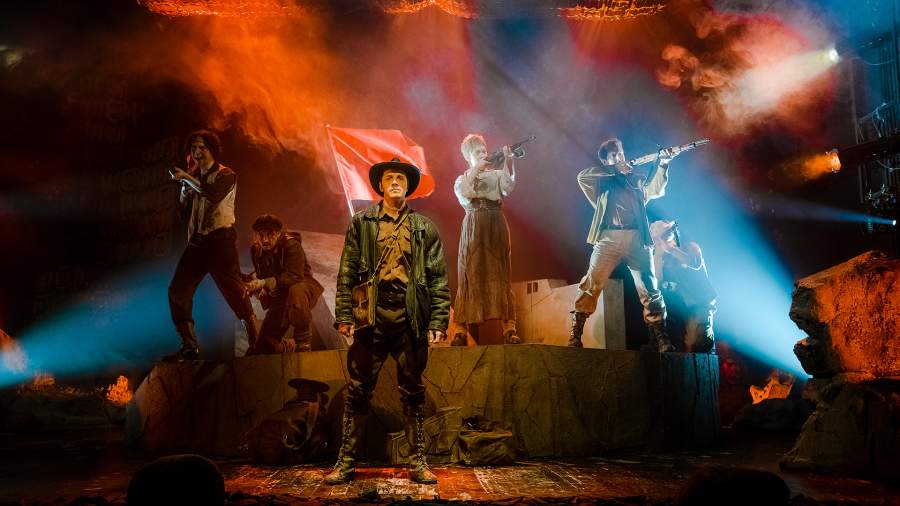
For Whom the Bell Tolls, directed by Mark Rozovsky— is a play inspired by director Salvador Dali. Ernest Hemingway's most popular novel is rarely seen on stage. Now the capital's audience has such an opportunity. Izvestia was among the first viewers and appreciated the premiere.
Dali's premonition
You can't create a play based on a three-dimensional novel without experience. And an experienced director will think ten times before taking up the staging of Hemingway. Over the past few years, only two directors have taken the risk. A year ago, Ivan Gushchin created the play "For Whom the Bell Tolls" at the Irkutsk Academic Drama Theater named after N.P. Okhlopkov. And in St. Petersburg, at the TOK Theater, Ekaterina Maximova presented monologues in the style of cante hondo (translated from Spanish - deep singing) to the audience.
The play was based on a novel by Hemingway. Artistic director of the Nikitsky Gate Theater, People's Artist of Russia Mark Rozovsky has been working on its creation for several years. It all started with a painting by Salvador Dali.
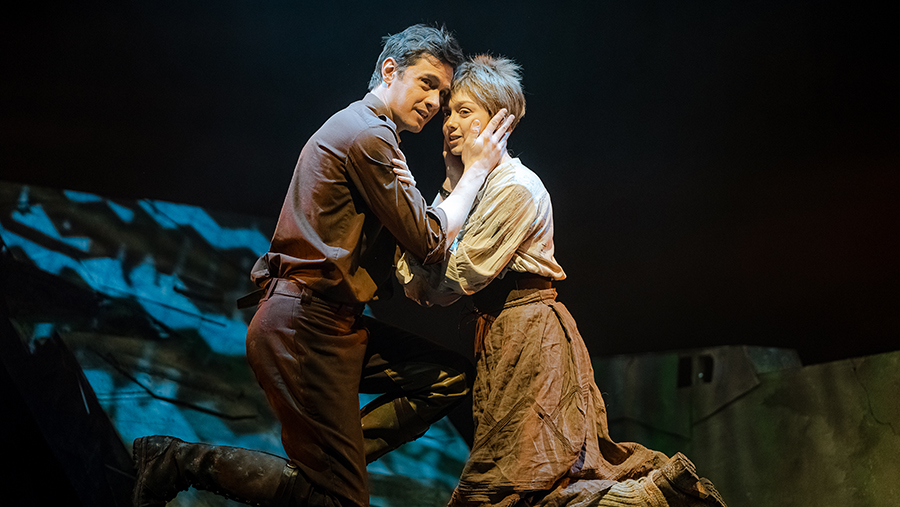
"Once I came across a painting painted in the spirit of surrealism,— Mark Rozovsky told Izvestia. — Its name struck me.: "A premonition of civil war." It was written in early 1936. The war was still six months away, but Dali was acutely aware of the impending catastrophe. And strangely enough, in this painting you can see the bridge — as in the work of Hemingway.
The novel tells a story that took place in May 1937. Young American Robert Jordan (Ivan Arngold) arrived in Spain to fight as part of an international brigade. By order of Golts (Stanislav Fedorchuk), he is thrown into the rear of the Francoists, to the partisans, led by a certain Pablo (Vladimir Davidenko). He is always accompanied by the brave and desperate Pilar (Honored Artist of Russia Olga Lebedeva). The American, as a demolition expert, is tasked with blowing up the bridge to prevent the approach of Francoist reinforcements. But in the squad, Jordan meets Maria (Irina Ukhanova), a girl whose life was ruined by the war. Her parents were shot in front of her, and the Nazis abused her. And she vowed to take revenge on them.
Shorten Hemingway
Mark Rozovsky came up with the idea to direct Hemingway's novel five years ago. But 800 pages of text cannot be staged. And then the director started writing a 60-page play. Following the precepts of his teacher Georgy Tovstonogov — to be faithful to the author, Rozovsky was scrupulous about Hemingway's text. He kept all the main themes of the novel.
"I took up this work by Hemingway because it is a great novel,— Mark Rozovsky confessed to Izvestia. — It's about what preceded the Second World War. There is a civil war in Spain. Hemingway describes the clash of human destinies in such conditions. In war, there are heroes, victims, conflicts, and even a place of love. It is she who helps to live and survive. Or at least to live. The novel has very powerful characters and psychological portraits. They make you think, reflect on what is evil, good. War is a disaster. And humanity requires protection. It seems to me that this is still relevant today.
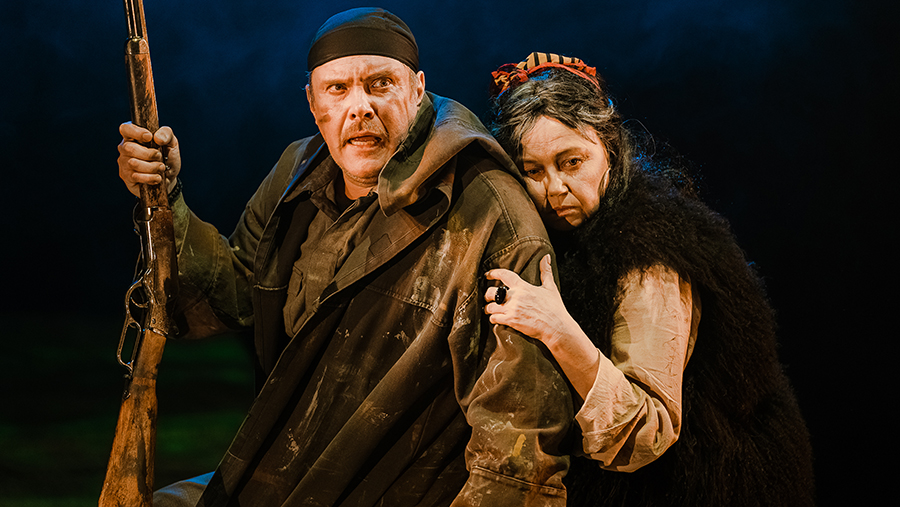
For Whom the Bell Tolls is a novel by Nobel laureate Ernest Hemingway, published in 1940. To this day, it is considered one of the best novels of the twentieth century. Hemingway showed the war to be real—dirty, bloody, and inhumane. But it is in such a situation that people are willing to sacrifice themselves for a lofty goal. And no matter what they say, it's scary for everyone to die.
Many of Hemingway's characters have prototypes. So, Mikhail Koltsov, the editor-in-chief of Pravda, is hiding behind the character of Karkov (Honored Artist of Russia Alexander Masalov). Hemingway's theme of Russians is widely expanded. After all, our compatriots were among the first to go to Spain to support the Republicans. And the American Hemingway participated in leftist Inter-Brigades. The writer was also on the Republican side. Therefore, he painted about a partisan detachment.
Fight with the stage
To stage a play based on prose, in which, in addition to personal tragedies, there is a war, is a difficult task from a technical point of view. Moreover, the New stage of the Nikitsky Gate Theater is small. But Rozovsky figured out how to do it. In the play, the director also acts as a production designer. Together with the set designer Sergey Starovoitov, they came up with a "block system" of decorations. Gray slabs made of light but durable material were replaced on a turning circle in the center of the stage. The dynamics of the action did not give even an attentive viewer a chance to notice the change of scenery. Sometimes these blocks depicted catacombs, then rocks in the mountains, then a barracks where fascists were being shot, then important offices, or a hotel room and a variety show.
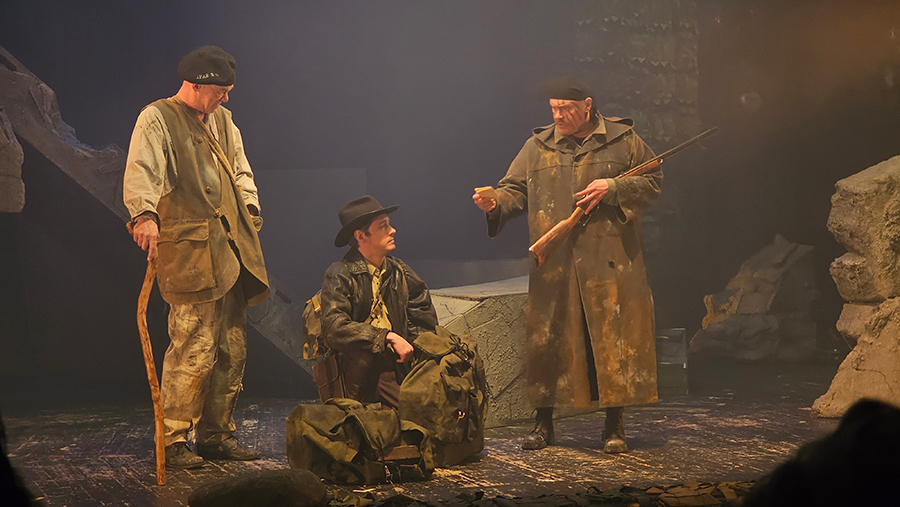
The play shows active military operations. The heroes shoot rifles, machine guns, pistols. The original move of the directors was to depict blood splashes with discarded scarlet handkerchiefs. To help create an atmosphere is the work of lighting designer Evgeny Bratyakov. In the absence of a spacious stage, the stage space rushed upwards. It adds volume. And an army camouflage net suspended from the ceiling becomes a filter for the shining spotlights.
According to Yana Prygankova, who plays Pilar, Mark Rozovsky as a director, together with a set designer, lighting and costume designers, created an amazing atmosphere of everyday life on stage, mixed with poetry and philosophy. The actors can only come into this world and honestly follow the path outlined by the author with their characters.
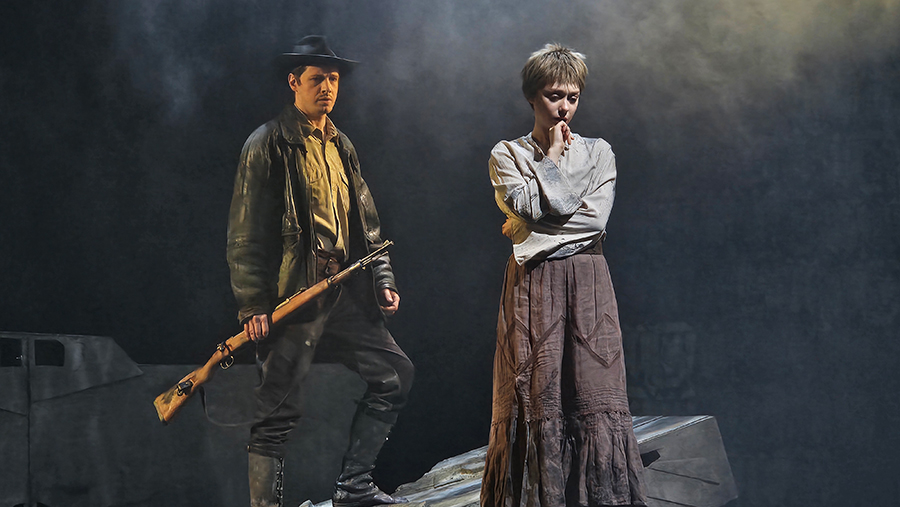
Even the actors play episodic roles emotionally, with the utmost intensity of passions. And among the main characters, Vladimir Davidenko stands out in particular. His guerrilla commander Pablo is a powerful job. The Moscow Art Theater Studio School is immediately visible. Vladimir Davidenko is a student of Leontiev's Avant-garde. Even his muscles are twitching. Pablo is smart, but very cruel. He killed more fascists than the bubonic plague. But with the arrival of the American bomber in the squad, Pablo became more and more afraid of death. And he wants to retire as a matador. "Pablo lives by the rules of the fox, just a little bit — in the hole,— says the guide Anselmo about him. —And the squad needs a wolf."
Anselmo is played by Honored Artist of Russia Andrey Molotkov. He has a confident, handsome, low baritone voice. Hearing it, you immediately want to straighten your back. You have to give orders in that voice, and they will be obeyed immediately.
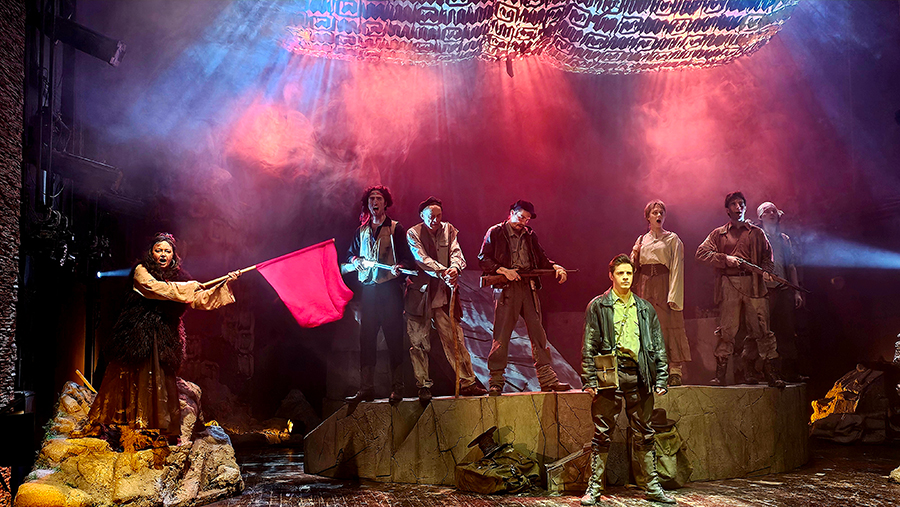
— Without a doubt, it is difficult to portray war on stage, — admits Vladimir Davidenko. — An actor's performance depends on full faith and immersion in the proposed circumstances. We can do this only thanks to the stories of our grandparents who fought in the Great Patriotic War.
The actor also noted that it would be interesting for a young audience to follow how love arises in a war when everything is against it.
The production is filled with music. The performance begins and ends with the tolling of bells. And as in Hemingway's text, don't ask for whom the bell tolls, it always tolls for you. You have to be careful with the music design. The works of various authors sound fragmented and quotable. Copyright allows it. The director calls Manuel De Falla the Spanish Stravinsky. His music has a touch of modernism, but with a folk basis, it has a Spanish theme. Another component with a national flavor is music from the "god of guitar" Enrique Granados. The Kremerata Ensemble of the world-famous violinist Gidon Kremer performs a piece by Arvo Pärt. During the war in Spain, according to Hemingway, "Madrid is fighting and walking." In the play, the city does this to Schnittke's "Tango." A passionate melody is played by Vladimir Spivakov's orchestra.
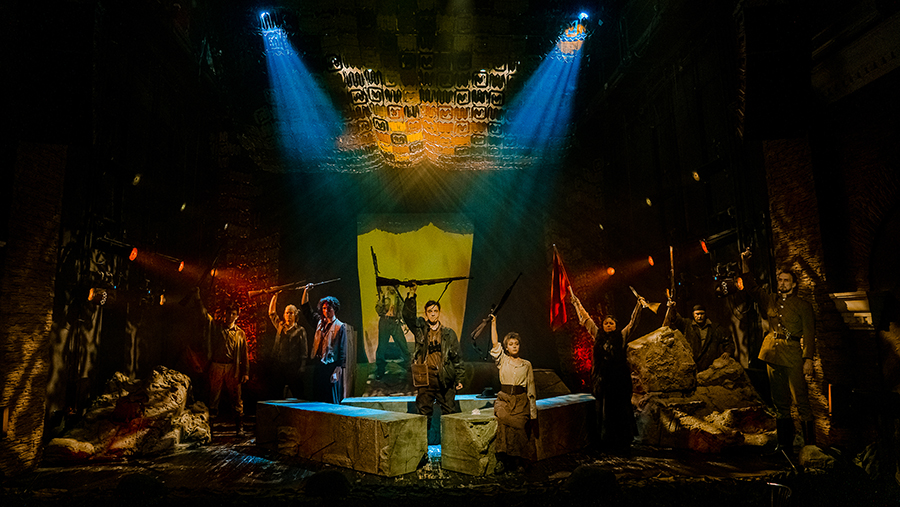
We recommend that you come to the performance in advance. Before the start, Joris Evans' film "Spanish Land", shot in 1937, is shown on the screens in the lobby. The script was written by Hemingway and the famous American writer Dos Passosa. So, it's worth coming an hour earlier. The next premiere is on April 18.
Переведено сервисом «Яндекс Переводчик»


